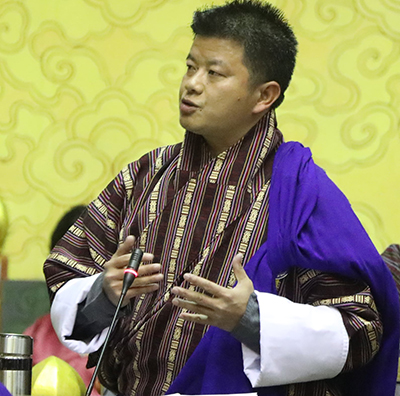 The motion to increase the retirement age of civil servants to 60 put forward in the National Assembly today ended in confusion. While the show of hands passed both the motions, it could not be passed when the House did electronic voting in the end. The motion was put forward by the Dewathang- Gomdar’s Member of Parliament (MP).
The motion to increase the retirement age of civil servants to 60 put forward in the National Assembly today ended in confusion. While the show of hands passed both the motions, it could not be passed when the House did electronic voting in the end. The motion was put forward by the Dewathang- Gomdar’s Member of Parliament (MP).
MP Ugyen Dorji moved the motion for the government to institute a system of reviewing the retirement age of civil servants from time to time, and to raise the retirement age for all categories of civil servants to 60 years.
During the deliberation, most of the members supported the motion.
“The old-age dependency rate in our country is 8.8 per cent. People are being categorized into old age before they actually get old. Although they have the capacity and talent to work, they have to resign due to age limit. If we give an example of health workers in the hospital, they resign at their given age but the country actually needs them,” said Choida Jamtsho, the Nganglam MP.
“I don’t think increasing the retirement age actually affects our youth. If a person resigns, a person who is already in service and is in line will take the post. I did not find any research saying that more the number of retirements will lead to the employment of more youth. Politicians have the privilege to serve till 65 and even 70 if one gets elected just before 65,” added Ugyen Wangdi, the Dramedtse Ngatshang MP.
However, some of the members shared their reservation in passing the motion. Members shared that raising the retirement age for civil servants to 60 might add on the already existing youth unemployment issue and other youth-related issues.
The Speaker then called for a show of hands to decide the fate of the motion. Both the motions received the majority of the support. However, the motion did not receive the majority of support when the speaker called for electronic voting. According to the National Assembly of Bhutan, the House did not pass the motion. Out of 40 members present and voting, 17 voted for the motion and 17 did not while 6 abstained.
The spokesperson of the Opposition party said since both the motions have been passed with majority votes from the show of hands, there was no need to call for electronic voting.
 “According to the Opposition, the motion is passed because as per the National Assembly Rules of Procedure of 2014, section 267, it is based on the majority. And also there are precedents in the past that when we had two motions, sometimes one motion got passed and the other got rejected. So we feel that once the two motions got passed based on the show of hands, there was no requirement to go to the electronic voting,” said Passang Dorji (PhD), the Bartsham Shongphu MP and the Spokesperson of the Opposition.
“According to the Opposition, the motion is passed because as per the National Assembly Rules of Procedure of 2014, section 267, it is based on the majority. And also there are precedents in the past that when we had two motions, sometimes one motion got passed and the other got rejected. So we feel that once the two motions got passed based on the show of hands, there was no requirement to go to the electronic voting,” said Passang Dorji (PhD), the Bartsham Shongphu MP and the Spokesperson of the Opposition.
The Rules of Procedure of The National Assembly, Section 267 states that after the debate, the speaker shall read out the question and call upon those members who are in favour and then those who are not. Section 268 states “The speaker shall then, on account of being taken, state whether or not he thinks the required majority of members present are in favour of the question and, subject to any challenges, he shall declare the question to have been so decided.”
BBS tried to contact the speaker for clarification but could not get through.
Kinley Dem




